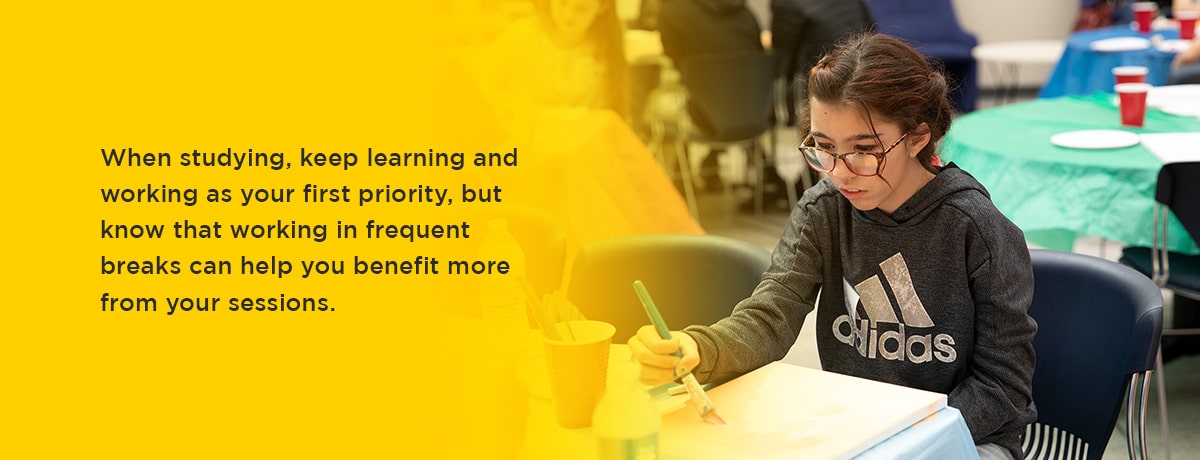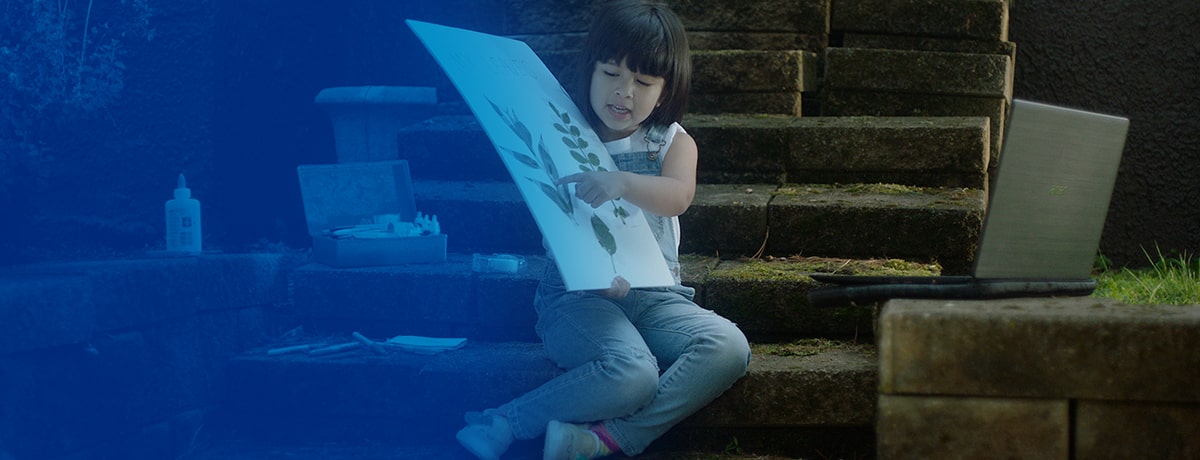Studying is an essential part of learning and retaining information. When you want to strengthen your study habits, you should add breaks to your workflow.
Why Take Breaks While Studying?
Understanding the importance of taking breaks while studying helps you remember to pause. Breaks can help you better optimize your study sessions to feel more prepared for class discussions, tests, or essays. There are many benefits of taking breaks while studying, including:
- Boosting memory: Successful studying is an art. Several short study sessions are often more impactful when remembering information than one long session. Breaking up one study session into multiple breaks allows you to review and engage with materials multiple times for higher chances of remembering content and its importance.
- Reducing stress: Thinking over the same problems or working frantically can boost stress and anxiety in students. Taking breaks from studying is a great way to decompress from schoolwork and academics, allowing your mind to rest and recover before returning to your work.
- Improving performance: When you want to enhance your academic performance, you can start with study breaks. Stepping away from your work briefly can allow your mind to refresh and recover. When you return to work, you can approach problems with new perspectives and mindsets for stronger work. Combined with improved memory, you can do better on tests, quizzes, and other assignments.
- Replenishing energy: Studying for long periods can be tiring. Breaks throughout your study session can help your body and mind feel refreshed and more awake, so you can better focus on your tasks.
- Resetting your posture: Many people sit in the same position when studying with their back, neck, and shoulders hunched over their materials. Breaks can relax your muscles for better care of your body while studying.

How Often Should You Take Breaks While Studying?
Study breaks can vary in length and frequency, depending on your study and learning goals. When studying, keep learning and working as your first priority, but know that working in frequent breaks can help you benefit more from your sessions.
When approaching study breaks, you can use two methods — spontaneous or scheduled. Spontaneous breaks depend more on your mood and energy levels, allowing you to assess your workflow and determine when it would be more productive to stop and start studying. Alternatively, scheduled breaks are ones you plan for at the beginning of study sessions.
Both methods offer several benefits and considerations. A spontaneous system is excellent for preventing burnout or overworking. If you feel tired, you can pause, allowing your mind and body to refresh so it can better learn when you return to studying. However, it is easy to lose track of how many spontaneous breaks you’ve taken. You might find you didn’t meet your study goals or have less time than you thought. This break type still requires some structure to work effectively.
A scheduled study break system will break your study session into actionable parts. You can use timers like the Pomodoro Technique to establish when to start and finish breaks, helping keep you on task and meet your study goals. Some students use content checkpoints to determine when to stop. For example, you might take a break after completing a particular vocabulary set or chapter review. Like timers, this system breaks down content so you can map out your session and ensure you cover all content.
However, the scheduled system leaves little room for changing energy levels and moods. You might need to take a break during a study session, and wait until the timer can yield less substantial results.
What to Do During a Study Break
When you want to implement breaks from studying, you have many options. You can test out as many of these as you like, helping you find the breaks that work best for you. Some ideas include:
- Exercising: Exercising increases your heart rate, allowing more blood to travel to the brain. The increased activity can help wake up your mind and prepare it for good work. Exercise is also essential for destressing, allowing you to focus better on your work and care for yourself. You can do simple activities, like walking, jumping jacks, or jumping rope, for excellent results in a short period.
- Stretching: When studying causes you to sit in the same position for prolonged periods, stretching can be the perfect short break. Take a few minutes to roll your shoulders, straighten your back, and stretch your neck. If you spend long periods writing and typing, wrist and hand stretches can also increase your comfort when studying.
- Showering: Self-care can refresh your mind and body when studying. Showering or bathing can take your mind off work and calm you, so you can return to work feeling more energetic.
- Meditating: If you need to relax and refocus your mind, meditation can help quiet your thoughts through reflection and breathing. You can conduct your own meditation routine or find guided options online through YouTube and podcasts.
- Cleaning your study area: Clutter can distract your focus from your studies. When you find it hard to think, consider using a break to clean your study space. Organize your notes, papers, writing utensils, and other objects. When you return to studying, you could have a clear mind ready to approach problems.
- Taking a short nap: Resting your eyes or taking a quick nap is helpful when you get tired. However, you want to ensure you are only taking a fast, light nap, so you can return to studying feeling refreshed rather than tired. Try to nap between 15-30 minutes.
What Not to Do During a Study Break
While students have many ways to take breaks between study sessions, they should also know what breaks are ineffective. Some activities can make it hard to return to work or leave you tired and groggy rather than refreshed and ready to work. These types of breaks to avoid include:
- Scrolling through social media: Social media can be a fun source of social interaction and entertaining memes, but endless scrolling can make it addicting. What starts as a short break can turn into hours lost. When you want to focus on your schoolwork, avoid this break activity.
- Eating a big meal: Snacking throughout study sessions helps maintain energy levels and satisfy hunger. However, planning study sessions around meals can impact your focus. Big meals can leave you tired, making it harder to focus on schoolwork.
- Taking a long nap: Short naps are great, but set alarms to prevent you from falling asleep for hours. While you need your sleep, you should avoid studying after a longer nap because you might feel more tired, fall back asleep, and lose crucial study time.
Enjoy Flexible Study Breaks With CCA
At Commonwealth Charter Academy, we recognize that everyone learns differently, so we created a public cyber school that offers personalized learning. Students and families can cater to their learning preferences and busy schedules by attending online classes live or watching recordings later. This system allows students to take meaningful breaks from their studies, so they can get the most from their classes.
Enroll at CCA or request more information to learn how your student can benefit from study breaks with CCA.




